
Roger William Corman was an American film director, producer, and actor. Known under various monikers such as "The Pope of Pop Cinema", "The Spiritual Godfather of the New Hollywood", and "The King of Cult", he was known as a trailblazer in the world of independent film.

Ride in the Whirlwind is a 1966 American Western film edited and directed by Monte Hellman and starring Cameron Mitchell, Millie Perkins, Jack Nicholson, and Harry Dean Stanton. Nicholson also wrote and co-produced the film with Hellman. A trio of cowboys are forced to become outlaws due to a case of mistaken identity by the local authorities.

The Shooting is a 1966 American Western film edited and directed by Monte Hellman, with a screenplay by Carole Eastman. It stars Warren Oates, Millie Perkins, Will Hutchins, and Jack Nicholson, and was produced by Nicholson and Hellman. The story is about two men who are hired by a mysterious woman to accompany her to a town located many miles across the desert. During their journey, they are closely tracked by a black-clad gunslinger, who seems intent on killing all of them.
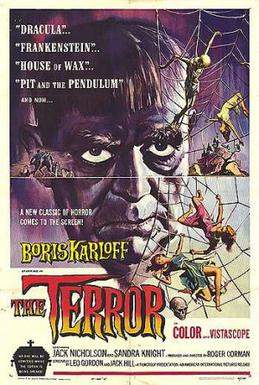
The Terror is a 1963 American independent horror film produced and directed by Roger Corman. The film stars Boris Karloff and Jack Nicholson, the latter of whom portrays a French officer who is seduced by a woman who is also a shapeshifting devil.

Will Hutchins is an American actor most noted for playing the lead role of the young lawyer Tom Brewster, in the Western television series Sugarfoot, which aired on ABC from 1957 to 1961 for 69 episodes.
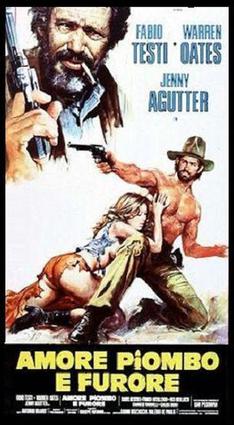
China 9, Liberty 37 is an Italian-Spanish 1978 Western film directed by Monte Hellman, starring Warren Oates, Jenny Agutter, and Fabio Testi. Noted director Sam Peckinpah has a small, rare acting role. The film was shot in locations in Spain and Italy by cinematographer Giuseppe Rotunno. Pino Donaggio composed the musical score. The English title refers to a sign seen at the beginning of the movie on U.S. Route 90 in Beaumont, Texas. Monte Hellman, utilized the scenic location of the highway to enhance the authenticity of its setting. Its inclusion adds an interesting detail to the narrative and showcases the attention to detail in the production. The film had a very sparse theatrical release in the United States, and did not play in some cities until as late as 1984.
Back Door to Hell is a 1964 American-Filipino war film concerning a three-man team of United States soldiers preparing the way for Gen. MacArthur's World War II return to the Philippines by destroying a Japanese communications center. It was produced on a relatively small budget and received lukewarm reviews.

Edgar Sinco Romero,, commonly known as Eddie Romero, was a Filipino film director, film producer and screenwriter.

Robert Lenard Lippert was an American film producer and cinema chain owner. He was president and chief operating officer of Lippert Theatres, Affiliated Theatres and Transcontinental Theatres, all based in San Francisco, and at his height, he owned a chain of 139 movie theaters.

The Ace of Spades is a 1925 American silent Western film serial directed by Henry MacRae. The serial is considered to be a lost film.

Dewey Dallas Martin was an American film and television actor.
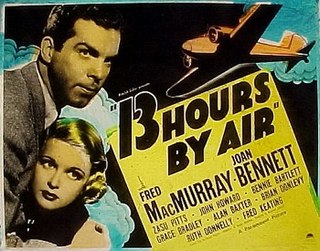
13 Hours by Air is a 1936 American drama film made by Paramount Pictures and directed by Mitchell Leisen. The film stars Fred MacMurray and Joan Bennett. The screenplay was written by Kenyon Nicholson and Bogart Rogers, based on story Wild Wings by Rogers and Frank Mitchell Dazey. 13 Hours by Air was also the forerunner of the disaster film, a genre featuring a complex, heavily character-driven ensemble cast, exploring the personal dramas and interactions that develop among the passengers and crew as they deal with a deadly onboard emergency.

Diamonds for Breakfast is a 1968 British comedy film directed by Christopher Morahan. The film opened in London but was never released in the US. It recorded an overall loss of $1,445,000.
Annabelle Huggins is a retired Filipino actress. In 1964 she starred alongside Jack Nicholson in Back Door to Hell, and later became famous when she was kidnapped by taxi driver Ruben Ablaza.

Spirit Warriors: The Shortcut is a 2003 Filipino fantasy horror adventure film directed by Chito S. Roño, and a sequel to the 2000 film Spirit Warriors. The film was written and directed by Chito S. Roño with screenplay by Roy C. Iglesias. It was distributed by Regal Films.

The Filmgroup was a production and distribution company founded by filmmakers Roger Corman and Gene Corman in 1959. Corman used it to make and distribute his own movies, as opposed to ones he was making for American International Pictures. The company ultimately folded, however, lessons from running the company helped Corman make a success later of New World Pictures. Filmgroup also produced early feature work of Francis Ford Coppola, Peter Bogdanovich, Charles B. Griffith, Curtis Harrington, Jack Hill, Monte Hellman, Robert Towne and Jack Nicholson.
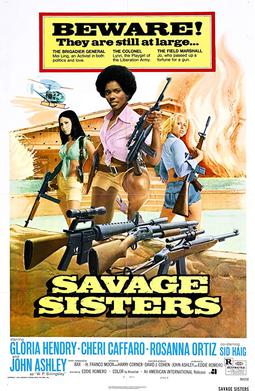
Savage Sisters is a 1974 women in prison film made in the Philippines and directed by Eddie Romero.

Thunder Island is a 1963 American action film directed by Jack Leewood, written by Don Devlin and Jack Nicholson, and starring Gene Nelson, Fay Spain, Brian Kelly, Míriam Colón, Art Bedard and Antonio Torres Martino.

Klondike Fury is a 1942 American drama film directed by William K. Howard, produced by the King Brothers, and released through Monogram. It stars Edmund Lowe.
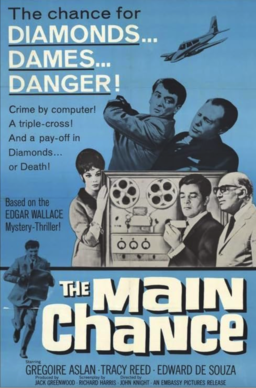
The Main Chance is a 1964 British second feature ('B') film directed by John Knight and starring Grégoire Aslan, Edward De Souza and Tracy Reed. Part of the series of Edgar Wallace Mysteries films made at Merton Park Studios, it was written by Richard Harris based on a story by Wallace.


















